i) Introduction
ii) Stephen Hawking
iii) Lawrence Krauss and Neil DeGrasse Tyson
iv) Philosophical Physicists
v) Philosophy and/or Prediction?
This discussion is hosted by the producer and writer Steve Paulson. It includes the American philosophers David Z. Albert (on the far right) and Jim Holt (in the middle); as well as the physicist Neil Turok (to the immediate right of the host).
Introduction
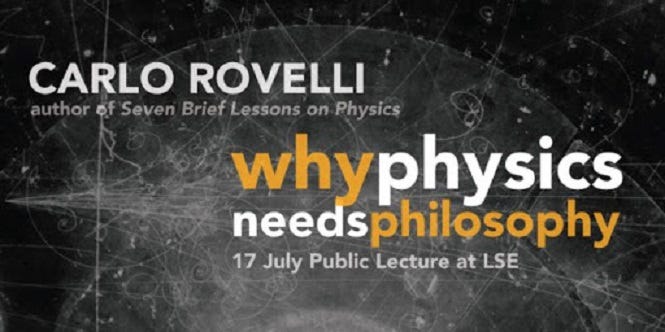
The video opens up with the host (Steve Paulson) asking this question:
“Why is it that so many physicists are bashing philosophers nowadays?”
Is that true? Stephen Hawking certainly had a go at philosophers and philosophy on more than one occasion. The host himself mentions Hawking saying that “philosophy is dead”. So why “dead”? It’s because (Hawking believed) “philosophers haven’t kept up with physics” (the host’s words). The following is what Hawking himself said (which isn’t quoted in full in the video):
“Traditionally these are questions for philosophy, but philosophy is dead. Philosophy has not kept up with modern developments in science, particularly physics. Scientists have become the bearers of the torch of discovery in our quest for knowledge.”
But let’s not single out Hawking. Here’s the biologist and naturalist Edward O. Wilson saying almost exactly the same thing:
“It appears to me that professional philosophers have not kept up with the foundational disciplines of neuroscience, behavioural genetics, and evolutionary biology, and as a result they have surrendered their franchise to the scientists. The scientists, not the philosophers, now address most effectively the great questions of existence, the mind, and the meaning of the human condition. This surrender seems to be permanent, and professional philosophers have begun a diaspora into other vital and challenging disciplines that include theoretical neuroscience, evolutionary theory, intellectual history and bioethics.”
In response to all that, and as David Albert puts it in the video, one gripe of physicists is that philosophers aren’t doing physics. Albert counters that by saying, “What the hell have physicists done for music lately?” (His point being that physicists are criticising apples for not being oranges.)
Anyway, having quoted the anti-philosophy stuff above from Stephen Hawking and E.O. Wilson, many philosophers themselves have claimed that philosophy is dead (if not in those precise words). Why “dead”? Again, it’s because philosophers haven’t kept up with physics/science. Ontic structural realists are a clear example of this. (Though even they don’t have every philosopher under the sun in mind.) And a few other philosophers (such as Daniel Dennett — see here) are also critical of philosophers for the same reasons cited by scientists.
One can understand how certain physicists are irked by philosophers if David Albert is correct when he states (in the video) the following:
“There have been instances of philosophers telling physicists that they’re not doing their jobs properly.”
That may explain things — at least to some extent. So take on board the following passage (which is in tune with what Albert has just said) from the philosopher of science, Wesley Salmon. He wrote:
“While the philosopher of science may be basically concerned with abstract logical relations, he can hardly afford to ignore the actual methods that scientists have found acceptable. If a philosopher expounds a theory of the logical structure of science according to which almost all of modern physical science is methodologically unsound, it would be far more reasonable to conclude that the philosophical reasoning had gone astray than to suppose that modern science is logically misconceived.”
The host also says that physicists claim that “philosophers don’t add any knowledge to the world”. That’s very ironic because it was philosophers themselves (e.g., the logical positivists and Ludwig Wittgenstein — see here) who first made precisely that point in the 1920s and 1930s.
Yet this also means that in order for physicists to claim that “philosophy doesn’t add any knowledge to the world”, they must do some philosophising themselves. That is:
i) Such physicists need to explain what they mean by “knowledge”.
ii) Such physicists need to tell us why philosophical claims aren’t examples of knowledge.
iii) Such physicists need to tell us why scientific knowledge is the only kind of knowledge.
iv) And such physicists need to tell us why they give scientific knowledge (or science itself) such a preeminent status.
None of the positive or negative answers to those questions will be scientific in nature. One would hope, then, that physicists will never argue that such questions shouldn’t even be asked. However, if any physicists did argue (or simply believe) that such questions shouldn’t be so much as asked, then that extreme position would itself need to be philosophically defended and backed up. And if such scientists didn’t defend it (or if they believe that they aren’t required to defend it), then that somewhat abolutist, elitist and arrogant stance will itself — again — need a philosophical defence. And despite all that, scientists like Lawrence Krauss (see later) and the British developmental biologist Lewis Wolpert (not mentioned in the video, though extremely anti-philosophy — see here) may deny that too.
In the video Jim Holt also makes the point that much of this philosophy “bashing” is itself philosophical. Indeed he says that about what Neil Toruc (the physicist to his left) himself had just said about philosophy. So, if physicists want to stay well clear of philosophy, then they better simply “shut up and calculate” (i.e., rely entirely on the mathematics/science, rather than, say, publish “popular science” books). Yet even in that case that too would require a philosophical defence and would include closet (or implicit) philosophical positions.
Stephen Hawking
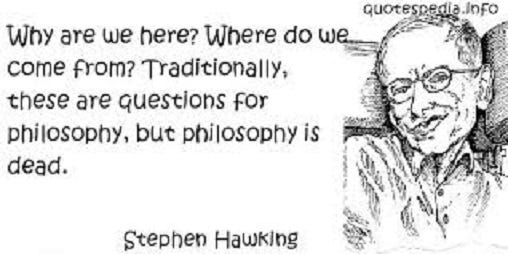
Stephen Hawking is actually a bad example of an anti-philosopher. That’s for the simple reason that what he said about philosophy is very naive. More importantly, Hawking himself offered the world his own philosophical position on physics; which he called model-dependent realism. Now how perverse is that?
So here’s a taster of Hawking’s own philosophy:
“There is no picture- or theory-independent concept of reality. Instead we will adopt a view that we will call model-dependent realism: the idea that a physical theory or world picture is a model (generally of a mathematical nature) and a set of rules that connect the elements of the model to observations. This provides a framework with which to interpret modern science.”
Sure, it might have been the case that Hawking didn’t see his model-dependent realism as a philosophical position. He might have seen it as a simple description of the facts and methodologies of physics. But that too would have been monumentally naïve. In addition, if Hawking really classed himself as “a positivist” (as David Albert claims in the video), then his rejection of philosophy was even more ridiculous and/or naïve.
Ironically, it can be just as easily be said that physics is dead because physicists like Hawking haven’t kept up with philosophy. After all, historically it was the case that nearly all scientific advances had their roots in philosophical ideas and theories. Albert Einstein himself owed a strong debt to both Ernst Mach (mentioned by David Albert) and Immanuel Kant (as well as others). Even Isaac Newton was well-schooled in philosophy and his own physics was called “natural philosophy”.
Lawrence Krauss and Neil deGrasse Tyson
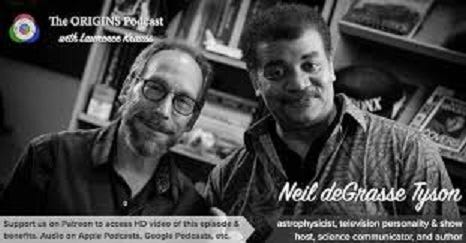
It’s interesting that the anti-philosophy physicists the host mentions (apart from Hawking) haven’t done any important work in physics. For example, he mentions the “cutting remarks” of Neil deGrasse Tyson and Lawrence Krauss. Now, no doubt Krauss and Tyson originally did do some work in physics. However, they aren’t known for that work. They’re known almost exclusively for being “popularisers of science”. And as a consequence of that, it can now be said that the revolutionaries of physics have always been both philosophically inclined and aware of much philosophy. I would suggest that Kraus and Tyson, on the other hand, are aware of almost zero contemporary philosophy and they probably know very little about dead philosophers too.
Having said that, if Krauss and Tyson (along with Hawking) already believe that “philosophy hasn’t kept up with science” (and therefore that philosophy has nothing to offer science/physics), then no wonder they have such a naïve view of philosophy. Krauss and Tyson are taking part in some kind of self-fulfilling prophecy here. That is:
i) Because Kraus and Tyson already believe that philosophy has nothing to offer science,
they never read philosophy.
ii) And because they never read philosophy,
they consequently believe that philosophy has nothing to offer science.
Thus all Krauss and Tyson are showing us here is their own ignorance of philosophy: they aren’t showing us that philosophers are ignorant of science. So, as already stated, one simply gets the impression (which can be backed up with fact) that people like Krauss and Tyson simply haven’t read much contemporary philosophy. Indeed I suspect that they don’t even know about much contemporary philosophy. (Jim Holt mentions the fact that when the philosophy of science is brought to the attention of scientists, they always say: “Oh, you mean Karl Popper?”) So, in that case, why do these anti-philosophy physicists believe what they believe about philosophy?
Philosophical Physicists
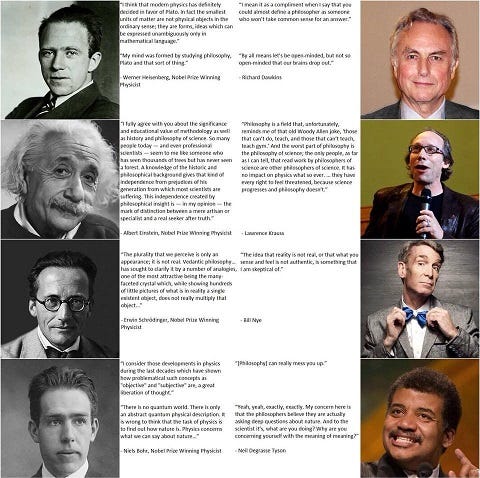
There have been a few other critical remarks about philosophers from physicists; though not as many as you may think. The opposite is in fact often the case. There have been many philosophical physicists. Having said that, being a philosophical physicist doesn’t necessarily mean that such a physicist must also be a big fan of philosophy (i.e., that he keeps bang up to date). Many physicists only ever mention dead philosophers and not contemporary ones. (Einstein, for example, was strongly inspired by Spinoza; though perhaps not so strongly in his purely scientific work.) On some occasions, the only “philosophers” some physicists rate are philosophical physicists, not philosophical philosophers.
In terms of contemporary and rather less recent philosophical physicists, we have Lee Smolin, Roger Penrose, Carlo Rovelli, Murray Gell-Mann, Julian Barbour, Paul Davies, Freeman Dyson, John Wheeler, Leonard Susskind, Martin Rees, Steven Weinberg, etc. But if we go back in history, there have been many other philosophical philosophers (from Isaac Newton to Niels Bohr); many of whom were very knowledgeable about philosophy.
Philosophy and/or Prediction?
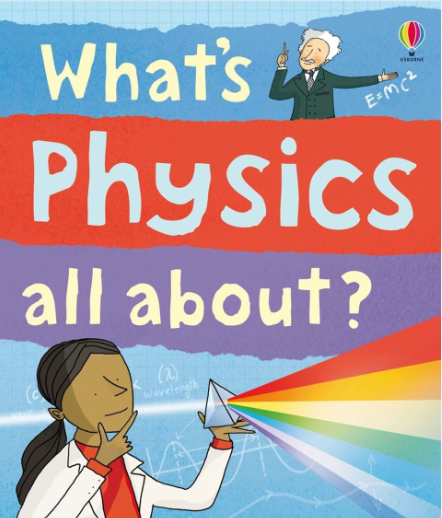
If (as David Albert says, ironically, in the video) some/most physicists believe that “physics is all about predicting the position of pointers” (not “how the world is” or “what the world is like”), then the layperson is probably on the philosophers’ side. (If all philosophers can be lumped together.) Having said that, physicists may have philosophical reasons as to why physics is all about prediction. Alternatively and as stated, that position may be philosophical in itself. That is:
If the “world as it is” is — by definition — out of reach, then emphasising the importance of prediction can be a very philosophical position to take. (Of course this may not be the reasoning of many physicists — though it could be.)
But is all this really about quantum mechanics? After all, since Niels Bohr and Werner Heisenberg in the mid-1920s, physicists themselves have being saying that they can’t tell us “what the world is like” (to use Albert’s words). All they can tell us about are observations, experimental tests, measurements and, yes, predictions. But that lack of access to the quantum realm itself requires both a philosophical defence and a philosophical explanation. Indeed it has received such things — from both physicists and philosophers.
And since quantum mechanics has just been brought up, it also needs to be said that all the “interpretations” of quantum mechanics are — almost by definition — philosophical. That is, they’re philosophical precisely because they’re interpretational. (David Albert cites “Everettian interpretations” and the “measurement problem”.)
So is physics really “all about prediction”? Many dispute this — including some physicists. Yet, ironically, one philosopher believed that physics is (more or less) all about prediction. That philosopher was W.V.O. Quine; who (in his ‘Two Dogmas of Empiricism’) wrote:
“As an empiricist I continue to think of the conceptual scheme of science as a tool, ultimately, for predicting future experience is the light of past experience. Physical objects are conceptually imported into the situation as convenient intermediaries — not by definition in terms of experience, but simply as irreducible posits comparable, epistemologically, to the Gods of Homer.”
**************************************










No comments:
Post a Comment